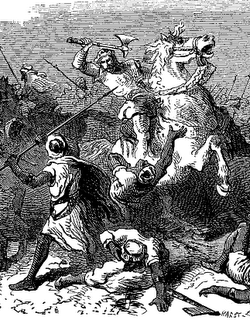
Islam spread like wildfire throughout the seventh century, sweeping Africa, the Middle East, Asia. The Visigothic kingdom of Spain fell in 711 and the vitality of the new religion did not wane. Despite the recent strength of the Visigoths, refugees in northern Spain, the Merovingian is now in sight ....
Storming the Frankish kingdom
Abd-er-Rahman, emir of Cordoba, wants to extend his conquests beyond the Pyrenees. In 719 in Narbonne is taken. In 725, it was the turn of Carcassonne and Nimes. Bordeaux is then sacked. Aquitaine is a land of plunder, very tempting because rich. Merovingian kings and the descendants of Clovis, have enough power to oppose it.
Charles Martel
Charles is the bastard son of Pepin of Herstal, mayor of the palace of Austrasia. A Carolingian therefore, the balance of a Merovingian king. He managed to win against the Neustrians. Rich, he has many villas in the region of Metz and Verdun. The wife of Pepin, Plectrude, Charles was locked. He escaped at age 25, in 714, the death of his father. Needless
take the place of his father as Mayor of the Palace of Austrasia. It multiplies the countryside from 716 against the Frisians, Saxons, Alamanni. It will submit to the Danube the Bavarians. In 731, he attacked Eudes of Aquitaine. Eudes, who had dealt with brash: in 721, he beat Toulouse and in order to avert the peril, allied to Mununza, the Governor of Berber Septimania. But the latter is killed by Abd-er-Rahman who resumed looting in southern Gaul.
Calling Eudes
When the Saracens, after pillaging the southern Aquitaine, take the road to St Martin of Tour, a rich abbey, Odo has little choice, he must use his enemy even if he fears that Charles Martel do to take advantage of the wealth of Aquitaine.
Charles will then gather his army, after having published the ban. He spent the Loire at Orleans and headed for Tower, near the abbey. He then took the direction of Poitiers, his army having melted with that of Odo. Moussa, the village of Vouneuil-sur-Vienne, the French are against the Saracens. 6 days, riders observed, is jaugent, engage in some skirmishes.
Clash of Civilizations
Saturday 25 October 732, the first day of Ramadan, the two armies are facing each other. Abd-er-Rahman Once the noon prayer ended, the load starts shouting "Ahadoum, ahadoum" (there is only one god). The tactic is clear: avoid confrontation general, crumble the opposing army and transform battle in a series of small battles. But the Franks, at war for 20 years, do not let themselves be intimidated by the screams of the Muslims, nor by the rain of arrows falling on the front row. It's time for francisques to launch the assault waves Arab who fail to break the wall franc.
Late in the afternoon, the Frankish army goes on the offensive. Brutal, bloody. Taking advantage of the fatigue Saracens they carnage in their ranks. Abd-er-Rahman tries to galvanize his troops, but is killed at the height of the battle. The dark stops the fight, much to the advantage of Charles who comes to save the West from the Muslim threat.
The next day, the Franks realize that the Saracens fled during the night. The looting of the camp begins and the Franks seized the booty that the attackers had to leave to escape: precious stones, fabrics, jewelry but also women and children who are sold as slaves. Charles did not chase the Saracens. For him, the goal was not to lead a crusade to break the attack but Abd-er-Rahman. But take the opportunity to seize the bishoprics and then goes away for lunch loot. He then chase the Muslim leaders who had settled there a few years ago. It is perhaps during this period that Charles gets his nickname of Martel (Hammer)
Offering Charles
At the chapel of St. Catherine of Fierbois Charles then deposit his sword. 700 years later, a dealer will find the sword by order of Joan of Arc. The rust would then miraculously fell from the blade.
An important date?
Poitiers is it a milestone in the history of Europe, a stop or one episode among many? Some historians believe the Battle of Poitiers has not had a major impact in Merovingian Gaul. The sources are few, these historians therefore believe that the battle has not been discussed. Arabic sources refer to as the Balat al-shuada (floor of the martyrs) but does not extend much further above. Carolingian propaganda has exploited this victory, in a clear purpose to denigrate the Merovingian. One can also find a clear desire to eclipse the victory of the Isaurian Basileus Leo III who had the assaults against Constantinople (one-year seat) and reaffirm the prominence of Byzantium on the Aegean Sea, Black Sea and the central Mediterranean. Its action for long dissuaded from attacking Muslims in Anatolia. But even if
Poitiers was only a battle among many others, even if it did not score a decisive stop to attack Muslim in Gaul (which will continue for several more decades), it has at least stopped the geographically attacks. Poitiers has never been exceeded. Charles Martel had withdrawn a large glory that propaganda can not alone explain. Finally, even if Islam was not well known Franks, columnists insisting on the difference the two religions.
732 is perhaps not an important date for some, but it has become since the advent of Pepin the Short. Recovered by some patriotic or nationalist movements, it remains a hinge to a halt, a victory, although one may say. Because it would have happened if he lost. Even if it was only a raid, a successful strike would have inevitably led to another.
0 comments:
Post a Comment